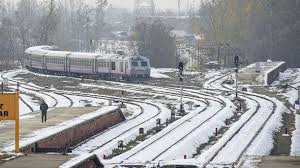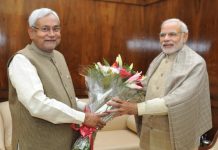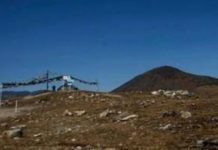A rail connectivity between Delhi and Srinagar begins this month, but with a mandatory transfer at Katra railway station in Jammu division. Political, trade, and civil groups in Kashmir have opposed the arrangement, calling it a façade of convenience for passengers. A report by Riyaz Wani

When on January 9, Indian Railways successfully conducted a trial run at a speed of 110 km/hour on the steep 179-degree gradient of the Katra-Banihal section of the Udhampur-Srinagar-Baramulla Railway Line (USBRL), it marked a big step towards connecting Kashmir directly to the rest of India by rail, a project over three decades in the making.
Speaking on the occasion, Dinesh Chand Deshwal, Commissioner of Railway Safety (CRS) for the Northern Circle, hailed the achievement as “a new chapter in the history of the Railways.” He acknowledged the efforts of engineers in navigating the region’s unique terrain.
“The trial run in such a challenging geography was smooth and filled us with a sense of fulfilment,” he said. “The credit for it goes to our engineers who have done such great work.”
The train connectivity between Delhi and Srinagar is set to begin this month – albeit, there will be no direct rail between the destinations. All the trains going to Srinagar and returning will have to stop at railway station in Katra in Jammu division every time for mandatory transfers. If one were to factor in the transshipment, the passengers will have to take two trains to complete a rail trip between Kashmir and Delhi.
This has been severely opposed by the political, trade and civil society organizations from Kashmir. “For years, we were told that train services to Kashmir would benefit the common masses and ease travel. This latest directive shows that Kashmiris are still far from experiencing any real travel convenience. The train services, which were inaugurated amid great fanfare, are turning out to be nothing more than a facade,” PDP General Secretary Mohammad Khurshid Alam said in a statement.
“This decision subjects ordinary people to unnecessary hardships. Security concerns should not be used as an excuse. Adequate checks can be conducted at the start of the journey. Forcing passengers to de-board midway and board another train in the name of security is both humiliating and impractical,” the leader added.
The Kashmir Valley Fruit Growers Cum Dealers Association (KVFGDU) said that the announcement of indirect train services from Kashmir to Delhi has dashed their hopes and they have sought attention of Lieutenant Governor Manoj Sinha and Chief Minister Omar Abdullah in this regard.
“The launch of Vande Bharat Express trains between Katra and Srinagar does not address the critical need for transportation of fresh produce”, Bashir Ahmad Basheer, Chairman KVFGDU, said. “Only direct rail connectivity between the Kashmir Valley and Delhi can ensure efficient and smooth transportation of fruits and vegetables to other parts of the country, as well as enable imports of essential goods into the region.”
In terms of tunnels and bridges, the USBRL project boasts one of the largest such numbers in the world. It has 38 tunnels spanning 119 km, including the country’s longest transportation tunnel, Tunnel T-49, measuring 12.75 km. It also includes 927 bridges covering a combined length of 13 km. These features make it one of the world’s unique railway tracks, adding to its tourism friendliness.
“We will start the train services,” Minister of Railways Ashwini Vaishnaw said while talking to the media about the project during the inspection of new coaches of Amrit Bharat train and other projects at Integral Coach Factory (ICF) in Chennai. “The outstanding project to build a new railway route is a testament to engineering excellence and determination, overcoming significant geographical and climatic challenges.”
The Srinagar-Delhi train has generated some excitement locally with people welcoming the train travel to the rest of the country – albeit, some apprehensions are also being aired.
“The train is expected to not only reduce the cost of ferrying goods to the Valley but also connect the region directly to other parts of the country, offering more avenues for business for the local traders and businessmen,” read an editorial in a local daily. “The train to and from Kashmir must go hand in hand with policies that prioritize sustainable development, ensuring that the region’s unique identity and fragile ecosystem are preserved while it embraces new opportunities.”













